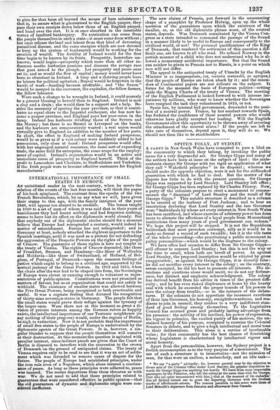THE IRISH REDEMPTION SCHEME.
SOMETHING is in preparation for Ireland. Its scope has been indicated ; but whether it will fulfil the promise or fall far short, dwindling into so many separate measures, no longer parts of a consistent scheme—like ponds left where a lake has been—no one seems able to say. Perhaps the scheme is not only unknown abroad but undetermined by its authors. It is to be hoped that they have gathered courage for the bolder course ; which would be the more advantageous in every way—for the Minister, for Ireland, for England. Such a comprehensive plan as that which has been attributed to Ministers, or as that which would be necessary to meet the ne- cessity of the case, would, no doubt, be an act of dictatorship. It would not on that account be the worse for the Minister promul- gating it. Quite the reverse. The only objection to a measure of that order would be, the doubt whether there is among our statesmen a man of sufficient originality and energy to undertake, it. If there were, it would be as emphatic an occasion as he could well find in the present day for displaying his faculties. Any thing short of an act of dictatorship would not suffice : in- telligent views or good intentions are to be found already—they are not the thing wanting, but it is courage and power for suffi- cient action.
Given the statesman, a large and wise act of dictatorship would be as easy as a smaller and more timid measure or set of measures. Any scheme would meet with opposition ; but the greater scheme would meet with no more effective resistance than the smaller would. On the contrary, any manifestation of real power, merely as such, would conciliate much support and would bear down much opposition. It would stimulate the hopes of that too large class in Ireland who are disposed to rely for assist- ance on Government, because the more potent the Government the fuller of promise the aid. Ireland is so unsettled—all her parties confounded, her agricultural system disorganized—that no body of men retains enough solidity to withstand any real power which possesses within itself a definite purpose and the means of action. The simple promulgation of a scheme amounting to an act of dictatorship, if it involved a programme of measures likely to be beneficial, would raise a presumption in favour of the Minister's power both intellectual and political—would scare away resistance—would anticipate his victory. The measure would be endowed at once with facility and glory in proportion to its aspect of potency.
In like manner, what Ireland wants is not a set of special de- tails to reform this or that abuse ; for you might alter almost any one of the many crying evils in Ireland without materially amending the condition of the country. The bogs might be crowded with a "peasant proprietary," and yet all the rest of Ireland be as pauperized as ever. Burdened lands might be confiscated, and the new absentee owners be just as useless to the country as the present. A simultaneous and consentaneous action in all parts is the desideratum. Stimulate employment as much as possible while other changes are working; guarantee subsistence to the destitute ; enable surplus (unemployable) labour to emigrate ; let the waste lands be settled as fast as they can advantageously be brought into cultivation ; facilitate the conveyance of overburdened es- tates; make Government aid correlative with official power over lands not paying up the dues on account of such Government aid ; let all these actions be going on at once, helping each other, devised and regulated so as to work as a harmonious whole ; and it is not impossible that Ireland might in a very short space of time be endowed with a degree of prosperity unprecedented in her history. For Ireland contains within herself the elements of wealth, but kept in a morbid condition. Hitherto every class has lived in the same unhealthy state of mind as a man who is ruin- ously involved in debt but hopes to put off the day of settlement and with it any thorough overhauling of his affairs : hence all their resources, mortgaged for that one delusive purpose, are fully avail- able to none. Too often, the landlords, ever hoping for some aid. the repayment of which may be indefinitely deferred, have neither the means to set the machine of industry at work nor the will to cede their lands to those who might. The labouring class, having no guarantee for existence but the possession of laud, are willing
to give for that boon all beyond the means of bare subsistence : that is, to secure what is guaranteed to the English pauper, they pare their own receipts down below those of an English pauper, and hand over the rest. It is at once absorbed in the insatiable vortex of landlord bankruptcy. No extrication can come from the people themselves in such a state—it must come from without ; but once release the land and labour from that kind of devouring parasitical disease, and the same energies which are now devoted to keep up the system of bankruptcy would be working for the creation of wealth. The fertility of Ireland would for the first time begin to be known by its fruits. Prosperity, heretofore un- known, would begin—prosperity which more than all other in- fluences sooths barbarian passions and disarms the savage race that goes armed to the plough. Let prosperity and peace once set in, and so would the flow of capital ; money would never have been so abundant in Ireland. A busy and a thriving people have no leisure for political agitation ; Repeal would be forgotten in the bustle of work—bustling because profitable ; and "the Saxon" would be merged in the customer, the capitalist, the fellow farmer, the fellow labourer.
Were such a change to be wrought in Ireland, it could scarcely be a greater blessing to herself than to England. Ireland is now a clog and a drain ; she would then be a support and a help. Be- sides the necessity of sparin,,e. the poor province, so that it contri- butes no equal share to the Imperial exchequer, she has now be- come a pauper province, and England pays her poor-rates in the lump. Ireland has harbours rivalling those of the Severn and the Mersey; but there is no Bristol or Liverpool on the banks, and the harbours are comparatively wasted : a real union would virtually give to England an addition to the number of her ports. In short, the effect to England of making Ireland prosperous, would be as great as if a vast colony were suddenly added to her possessions, only close at hand : Ireland prosperous would offer, with her unganged natural resources, the same sort of expanding trade, the same field for enterprise, the same scope for the employ- ment of capital. Ireland's regeneration would be an active and immediate cause of prosperity to England herself. Think of the profit to Lancashire and Cheshire, to Staffordshire and Yorkshire, if the Irish people were to become effective customers for English manufactures































 Previous page
Previous page